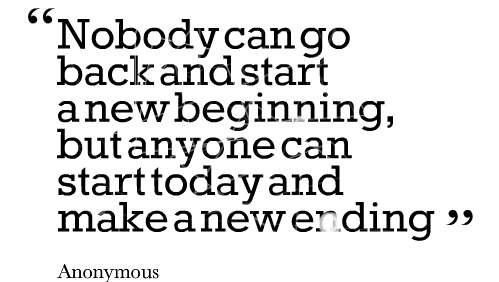Success Advice
How To Write New Years Resolutions That You’ll Actually Stick To

The coming of a new year is the perfect time to take stock of your life, and decide whether it’s going where you want it to go. Chances are, you have room for improvement. (We all do) But how do you make it happen?
You know that if you keep doing the same stuff you’ve always done, you’re only going to get the same results you’ve always gotten. Yet change is hard! Waking up with motivation, trying to force yourself to get up extra early and exercise… to leave off the desserts… to quit your job and become an English teacher in Taipei… or whatever it is you want to do with your life, is easier said than done.
Chances are, you tried that last year. If it worked, great! You know exactly what to do. If it didn’t, then that’s probably why you’re reading this. Never fear. There is hope. There is a 7-step formula to writing your New Years resolutions that won’t just make you stick to them, it will make sticking to them easy and convenient!
You’ll find yourself coming up with ways to stick to your resolutions almost without thinking about it. In fact, this formula has been used for over 40 years by people who — as long as they followed every step — found themselves getting everything they ever wanted.
How To Write Successful New Years Resolutions
1. Write your new year resolutions down
Write each new year resolution down, on paper.
Not sure how to write an effective resolution? Here’s what you do.
Start by making a list of everything you need, like money to pay the rent. Then, make a list of everything you want: the abs, the car, the charisma, the not having to worry about money and being able to spend your afternoons reading a book.
Now, compose your resolutions, asking yourself these 9 following questions for each one.
1. Do I really want this? Or is this just to “sound good,” or because I think it’s easy to achieve?
2. Does this contradict any other resolution? If so, adjust one.
3. Would this conflict with others — like others around me? If so, work out the differences.
4. Is it positive, instead of negative? Your resolutions are about what you want, not what you want to get rid of. A washboard stomach, not losing fat.
5. Is it detailed? If you want something, include all the detail you can, even the model number!
6. Can this be achieved by a human being? Leaping tall buildings in a single bound — maybe not. Owning a helicopter, though…
7. Is it high enough? If you really want something, you’ll find a way to achieve it. But if you set the bar low, you’ll only limit yourself.
8. Am I including the personal changes I need to make? Chances are, you’ll need self-confidence and determination, among other personal qualities, if you’re going to achieve your goals.
9. Have I written each resolution as if it’s already accomplished? Don’t say “I want,” “I wish,” or “I need.” Say “I have,” “I am,” or “I own.”
2. Read your resolutions twice a day
Every day as soon as you wake up, read your resolutions. Then, just before you go to sleep that night, read them again!
Make sure to leave plenty of room on the paper or in your notebook for adding new ones throughout the course of the year. As you progress towards achieving your goals, you’ll come up with new ones.
3. Read your resolutions out loud!
You can do it in the mirror, or just to yourself, but read them out loud. Saying something out loud impresses it more deeply on your mind, which keeps you working towards them.
“I hope that in this year to come, you make mistakes. Because if you are making mistakes, then you are making new things, trying new things, learning, living, pushing yourself, changing yourself, changing your world. You’re doing things you’ve never done before, and more importantly, you’re doing something.” – Neil Gaiman
4. Visualize achieving your resolutions as you read
Every time you read your list, visualize yourself achieving each one. See yourself looking in the mirror, feel the soft leather seat and powerful acceleration of your new car, or hear the crashing ocean as you sit on the beach. The more detailed your visualizations, the better they work.
5. Make your resolutions positive
You learned about this a bit already. Your resolutions absolutely must be positive. Think about what you want to have. Resolutions to get rid of something don’t work.
When you make your resolutions, you probably have things you do want to get rid of, but don’t write them that way. Figure out what getting rid of those things will bring you… and write your resolutions about that.
6. Make them about you only
You can’t resolve to change other people. Sorry, but it mostly doesn’t work — and when it does, there’s always so much “blow back” you end up two steps back for every one step forward.
7. Make them detailed
Just like with visualizations, the more detailed your resolutions are, the better you’ll be able to achieve them.
In many respects, you’re writing a “purchase order” for your mind. You’re telling yourself what to go out and get… and when you’re in the thick of it during the year, all you’ll be referring to is this list. So tell yourself exactly what you want, and there will be no confusion.
Oh, and almost forgot. There is one more step. Start now! Procrastination and drifting along is the only thing that can really keep you from achieving your resolutions. So write them now!

Feature Image Courtesy of ScreenCrush
Ready To Write Down Your Goals & Reach Them? Read more blogs about reaching your goals and success on Addicted 2 Success
-
-
- 6-Step Process For Reaching Your Goals
- Powerful Life Lessons From David And Goliath Story
- 5 Ways To Achieve Your Goals
- Reasons Why It Is Important To Follow Your Dreams
- Signs That You’re Self Sabotaging
- 1o Things Stopping You From Achieving Your Goals
- 6 Personal Growth Challenges To Transform Your Life
- 11 Habits To Achieving Greatness In Your Life
- 21-Day Rule That Can Change Your LifeReasons
- Why It’s So Important To Follow Your Dreams
-
Business
Why Smart Entrepreneurs Are Quietly Buying Gold and Silver
When stocks, property, and cash move together, smart business owners turn to one asset that plays by different rules.

You’ve built your business from the ground up. You know what it takes to create value, manage risk, and grow wealth. But here’s something that might surprise you: some of the most successful entrepreneurs are quietly adding physical gold and silver to their portfolios. (more…)
Business
The Simple Security Stack Every Online Business Needs
Most small businesses are exposed online without realising it. This simple protection stack keeps costs low and risks lower.

Running a business online brings speed and reach, but it also brings risk. Data moves fast. Payments travel across borders. Teams log in from homes, cafés, and airports. (more…)
Business
If Your Business Internet Keeps Letting You Down, Read This
From smoother operations to better security, dedicated internet access is quietly powering today’s high-performing businesses.

Today, a dependable internet service is the bedrock for uninterrupted business operations. Many organizations rely on stable online connections for communication, data transfer, and customer interaction. (more…)
Did You Know
How Skilled Migrants Are Building Successful Careers After Moving Countries
Behind every successful skilled migrant career is a mix of resilience, strategy, and navigating systems built for locals.

Moving to a new country for work is exciting, but it can also be unnerving. Skilled migrants leave behind familiar systems, networks, and support to pursue better job opportunities and a better future for their families. (more…)
-

 News4 weeks ago
News4 weeks agoBrandon Willington Builds 7-Figure Business by Ignoring Almost Everything
-

 Business3 weeks ago
Business3 weeks agoEntrepreneur’s Guide to Pay Stubs: Why Freelancers and Small Business Owners Need a Smart Generator
-

 Business3 weeks ago
Business3 weeks agoThe Salary Shift Giving UK Employers An Unexpected Edge
-

 Scale Your Business3 weeks ago
Scale Your Business3 weeks ago5 Real Ways to Grow Your User Base Fast
-

 Business3 weeks ago
Business3 weeks agoThe Simple Security Stack Every Online Business Needs
-

 Finances3 weeks ago
Finances3 weeks agoWhy Financial Stress Is One of the Biggest Barriers to Personal Growth
-

 Business2 weeks ago
Business2 weeks agoWhy Smart FMCG Entrepreneurs Outsource What They Can’t Automate
-

 Did You Know2 weeks ago
Did You Know2 weeks agoThe SEO Traps Even Experienced Marketers Fall Into





















12 Comments